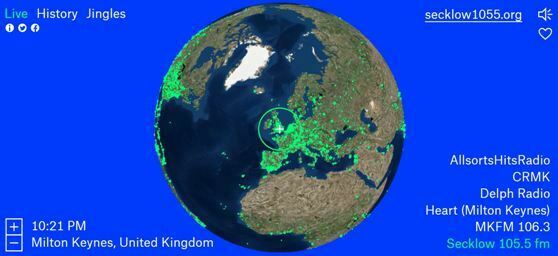
Yes, 2018 is winding its way, unapologetically, to the bitter and, and it is time for some reviews of the year. As in past years, I’m producing a series of posts over December listing some of the things cultural that appealed to me over the year. To kick things off, here’s the year online – some new sites, some old ones that I only came across this year, all well worth exploring. In almost entirely random order…
- Radio Garden – An explorable globe of the world’s radio broadcasts, as clever yet simple an app as you’ll find anywhere
- Palladio – First-rate data visualisation tool from Stanford University. Makes any historical project look so stylish and smart
- The Listening Experience Database – From the people who gave us the excellent Reading Experience Database (i.e. the Open University) comes this database of people’s documented responses of listening to music of kinds, from all time periods and places
- Historical Newspapers – The National Library of Luxembourg has set a standard for the clear presentation of historical newspaper data, designed for beginners and experts alike
- Netflix Research – fascinating site on the thinking behind Netflix, with lots on machine learning, personalisation and data analytics. If we are all now slaves of data we might at least understand how it is that they go about controlling us (or we controlling them?)
- The Visual Telling of Stories – Chris Mullen’s sprawling website collects images from advertisements around themes, from big (Food, Drink, Sex) to the micro (Shop Windows, Giants, Hiccups). The antiquated search system only adds to the peculiar adventure on offer. Quite Shandyesque (there’s a special section on Tristram Shandy)
- BBC Sound Effects – 16,000 sound effects from the BBC, and all yours
- What did Earth look like xxx years ago? – Fill in the gap with whatever date you choose, pick a place and see the continents shift

- Roads to Rome – How many roads are there to Rome? Well, there are 486,713 starting points. Could you map these for me, with an algorithm to calculate one route for every trip? Sure. This is the sort of thing for which the Internet was invented
- Caselaw Access Project – The Internet was also invented for this sort of thing: three hundred and sixty years of United States caselaw. So far it’s the data only, with page images and page-level OCR to follow in due course
- National Screening Room – a rich and diverse collection of historical films from the Library of Congress, most of them available for download as well as viewing online
- The Bioscope – The British Newspaper Archive is digitising the whole of The Bioscope, the essential British silent era film journal. By the time you read this they may have completed the task. So many sighing scholars now feeling they should revisit that lifetime’s project all over again…
- Centuries of Sound – Pick a year, pick a sound (1859-1909 so far)
- Here’s what your Twitter timeline would’ve looked like 10 years ago – An absurd exercise, but irresistible, if only to see just long some of those you follow have been keeping up this lark
- Scissors-and-Paste-o-Meter – The cutting edge (literally) of digitised newspaper studies. Melodee Beals’ tool invites you to enter the date, title and page of any newspaper from the British Library’s 19th Century Newspaper Collection, or the Times Digital Archive, and see how stories spread over the globe from newspaper to newspaper

- Conserve the Sound – An old site, seemingly not being updated, collecting everyday sounds and the objects that generate them, with some terrific photography. Light switches, heat blowers, typewriters, film projectors… If only there were more
- Writing Lives – a collaborative research project on working-class autobiographies, organised by four UK universities (Brunel, Liverpool John Moores, Open University, Sheffield Hallam). Full of treasures, though it would be good if they had a simple About page to explain things. The promised Archive of Working-Class Writing Online will be so welcome
- Seat 31B: The World in Economy Class – richly entertaining (and informative) site about cheap air flights across the globe, from the widely-travelled but economically-minded TProphet
- Just Another Tune – Splendid, well-established personal site from folklorist Jürgen Kloss, giving the detailed, engrossing background histories to songs, mostly traditional folk songs but some Bob Dylan as well (see the superb essay on ‘Call Letter Blues‘)
- At the Pictures – Lawrence Napper’s blog on film history (mostly early British film history) has become essential reading in a very short space of time. Check out, for instance, Sleeping in the (Silent) Cinema. The truth is out
- Isles of Wonder – My big, mad web project this year was a shot-by-shot screengrab archive of the video of the opening ceremony to the London 2012 Olympic Games. 1,630 images, and I’m still working on describing each one
- The Library of Babel – If Jorge Luis Borges has been into building websites, this is what he would have created. It has the simple aim to contain every book that ever has been written, and every book that ever could be. Search for anything (and that is any combination of letters), or browse the bookshelves. Then read about just how impossible the whole idea is
Hi Luke. That was a wonderful collection of riches. When I was a kid, I would have had a lot of fun with the sound effects.
Me too. I wish I could think of better uses for them than just novelty. but I assume the right people are downloading them and being really creative with them.